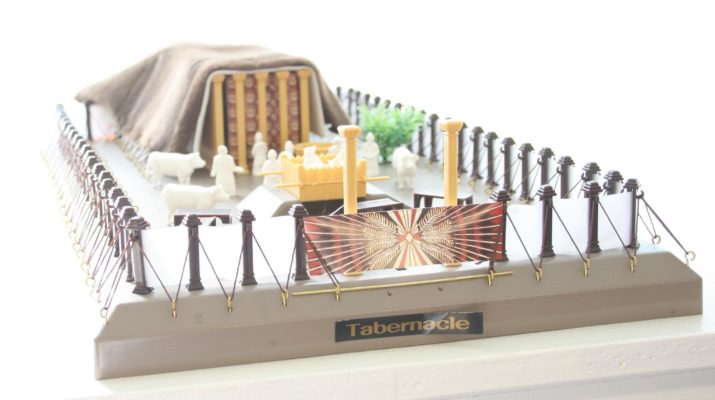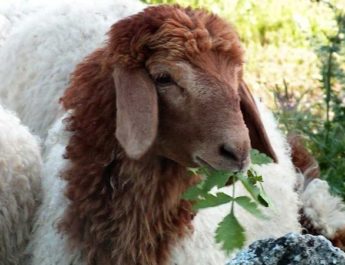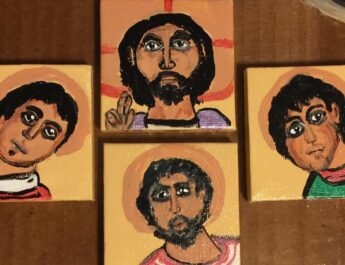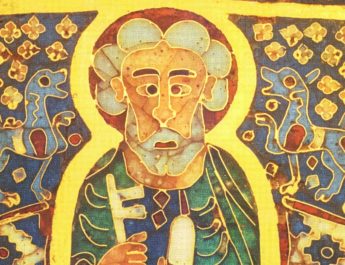Leviticus 17
BibleHub
1 The LordI spokeII to Moses:III
Notes on verse 1
I “Lord” = YHVH. From havah (to be, become) or hayah (to come to pass, become, be). This is the name of the God of Israel, the self-existent and eternal one, the tetragrammaton. This pronunciation has been lost to time so “Lord” is generally used in its place.
II “spoke” = dabar. This is generally to speak, answer, declare, or command. It might mean to arrange and so to speak in a figurative sense as arranging words.
III “Moses” = Mosheh. From mashah (to pull out in a literal or figurative sense, to draw out) OR from Egyptian mes or mesu (child, son i.e. child of…). This is Moses – the one drawn out from the water, which is to say, rescued. If derived from the Egyptian, his name would share a root with Rameses and Thutmose.
2 “Speak to AaronIV and his sonsV and to allVI
Notes on verse 2a
IV “Aaron” = Aharon. Derivation uncertain. May mean “bearer of martyrs” OR be related to Ancient Egyptian ꜥḥꜣ rw (warrior lion) OR elevated, exalted, high mountain. This is Aaron. See https://en.wiktionary.org/wiki/Aaron
V “sons” = ben. From banah (to build or obtain children). This is son, age, child. It is son in a literal or figurative sense.
VI “all” = kol. From kalal (to complete). This is all or every.
the IsraelitesVII and say to them: This is whatVIII the Lord has commanded.IX
Notes on verse 2b
VII “Israelites” = ben + Yisrael. Literally, “children of Israel.” Ben is the same as “sons” in v2. See note V above. Yisrael is from sarah (to persist, exert oneself, contend, persevere, wrestle, prevail) + el (God or god). This is Israel, meaning God strives or one who strives with God; new name for Jacob and for his offspring. This refers to the people and to the land.
VIII “what” = dabar. Related to “spoke” in v1. From dabar (see note II above). This is speech, a word, a matter, an affair, charge, command, message, promise, purpose, report, request. It is a word, which implies things that are spoken of in a wide sense.
IX “commanded” = tsavah. This is to charge, command, order, appoint, or enjoin. This is the root that the Hebrew word for “commandment” comes from (mitsvah).
3 If anyoneX of the houseXI of Israel slaughtersXII an oxXIII
Notes on verse 3a
X “anyone” = ish + ish. Perhaps from enosh (human, humankind, mortal); from anash (to be weak, sick, or frail). This is man, husband, another, or humankind.
XI “house” = bayit. Related to “sons” in v2. Probably from banah (see note V above). This is house, court, family, palace, temple.
XII “slaughters” = shachat. This is to slaughter, slay, or beat. It can be slaying for a sacrifice or in a massacre.
XIII “ox” = shor. Perhaps from shur (to travel, turn, journey; travelling like a prostitute or a merchant). This is bull, ox, head of cattle, cow.
or a lambXIV or a goatXV in the campXVI or slaughters it outsideXVII the camp
Notes on verse 3b
XIV “lamb” = keseb. 13x in OT. From kebes (root may mean to dominate; a young male sheep at the age of butting other sheep). This is apparently the same word as kebes, but with the consonants mixed up. It is a young lamb or sheep.
XV “goat” = ez. Perhaps from azaz (to be strong in a literal or figurative sense, overcome, be impudent). This is a female goat, but can refer to male goats when plural.
XVI “camp” = machaneh. From chanah (to decline, bending down, or living in tents; can be camping to create a home or camping as a part of battle). This is an encampment, whether of people traveling together or soldiers. So, it can be a camp band, or company as well as an army of soldiers. Also can be used of other groups like animals, angels or stars.
XVII “outside” = chuts. Root may mean to sever. So, this is something that is separated by a wall – the outside, the street, a field, highway, or abroad.
4 and does not bringXVIII it to the entranceXIX of the tentXX of meeting,XXI
Notes on verse 4a
XVIII “bring” = bo. This is to enter, come in, advance, fulfill, bring offerings, enter to worship, attack. It can also have a sexual connotation.
XIX “entrance” = petach. From patach (to open wide in a literal or figurative sense, loosen, plow, carve). This is opening, door, gate, entrance.
XX “tent” = ohel. Perhaps from ahal (to shine, be clear). This is a tent, covering, home, or side pillar.
XXI “meeting” = moed. From yaad (to appoint, assemble or gather selves, agree). This is a meeting, assembly, fixed time. It can be used for a festival or feast. It can also refer to a meeting place.
to presentXXII it as an offeringXXIII to the Lord beforeXXIV the tabernacleXXV of the Lord,
Notes on verse 4b
XXII “present” = qarab. This is to come near, offer, make ready, approach, take.
XXIII “offering” = qorban. Related to “present” in v4. From qarab (see note XXII above). This is an oblation or offering, which is to say, a sacrifice.
XXIV “before” = paneh. From panah (to turn, face, appear). This is face in a literal or figurative sense. It could be face, presence, anger, respect. It can also be used of God to indicate divine favor or presence.
XXV “tabernacle” = mishkan. From shakan (to settle down in the sense of residing somewhere or staying there permanently; to abide or continue). This is a place where one lives – a tabernacle, tent, or other kind of dwelling. It can also be a lair where animals live, the grave, the Temple, or the Tabernacle.
heXXVI shall be held guiltyXXVII of bloodshed;XXVIII he has shedXXIX blood,XXX
Notes on verse 4c
XXVI “he” = ish. Same as “anyone” in v3. See note X above.
XXVII “held guilty” = chashab. This is properly to braid or interpenetrate. Literally it is to create or to wear. Figuratively, it can mean plotting – generally in a negative sense. More broadly, this can also mean think, consider, or make account of.
XXVIII “bloodshed” = dam. Perhaps from damam (to cease, be or become mute, silent, still, cut off, hold peace, be astonished, die). This is blood, bloodshed, bloodguilt, lifeblood, and death. It is used for people and animals. More often blood from a wound or the blood of the innocent. Used figuratively for violence or for wine. Closely tied to life and death.
XXIX “shed” = shaphak. This is to pour out, gust, or slip. It can be to pour as blood, a drink offering, or molten metal. It can also mean to create a mound. Figuratively, it can refer to killing, or spending money.
XXX “blood” = dam. Same as “bloodshed” in v4. See note XXVIII above.
and heXXXI shall be cut offXXXII fromXXXIII the people.XXXIV
Notes on verse 4d
XXXI “he” = ish. Same as “anyone” in v3. See note X above.
XXXII “cut off” = karat. This is to cut down, cut off, or make a covenant (idiom for making a covenant is “to cut a covenant”). It can also mean to destroy, fail, or consume.
XXXIII “from” = qereb. Related to “present” and “offering” in v4. Perhaps from qarab (see note XXII above). This is among, in the midst, before, the center It is the inward part, whether literal or figurative. It can also be used for the heart, the site of thoughts and feelings. This word is also used as a technical term for the entrails of the animals who are sacrificed.
XXXIV “people” = am. From amam (to darken, hide, associate; creating shadows by huddling together). This is people or nation. It can be used specifically for a tribe, collectively of troops or armies, or figuratively to refer to a flock of animals.
5 This is in order that the Israelites may bring their sacrificesXXXV that they offerXXXVI in the openXXXVII field,XXXVIII that they may bring them to the Lord, to the priestXXXIX at the entrance of the tent of meeting, and offer them as sacrifices of well-beingXL to the Lord.
Notes on verse 5
XXXV “sacrifices” = zebach. From zabach (to kill, slay, offer; slaughtering an animal to offer as a sacrifice). This is a slaughter – literally of an animal. So, it implies the act or the animals used in sacrifice. Further, it can mean offering.
XXXVI “offer” = zabach. Related to “sacrifices” in v5. See note XXXV above.
XXXVII “open” = paneh. Same as “before” in v4. See note XXIV above.
XXXVIII “field” = sadeh. This is literally field, ground, soil, or land. It can be used to mean wild like a wild animal.
XXXIX “priest” = kohen. This is literally the one who officiates i.e. the priest. This is where the Jewish last name “Cohen” (and its variants) comes from.
XL “well-being” = shelem. From shalam (to make amends, finish, be safe, be friendly, to be complete or sound). This is a peace offering or a sacrifice of well-being. It was a voluntary offering given when one celebrated thanksgiving, alliance, or friendship.
6 The priest shall dashXLI the blood against the altarXLII of the Lord at the entrance of the tent of meeting and turn the fatXLIII
Notes on verse 6a
XLI “dash” = zaraq. This is to scatter or sprinkle, whether a liquid or a solid.
XLII “altar” = mizbeach. Related to “sacrifices” and “offer” in v5. From zabach (see note XXXVI above). This is an altar.
XLIII “fat” = cheleb. This is fat, finest, marrow. It is fat in a literal or figurative sense. It refers to the richest or best part.
into smokeXLIV as a pleasingXLV odorXLVI to the Lord,
Notes on verse 6b
XLIV “turn…into smoke” = qatar. Perhaps from qetoreth (smoke, incense, the scent of the sacrifice as it burned); from the same as qitor (thick smoke, vapor). This is to make an offering, particular one of burned incense. It focuses on the fragrance made from the sacrificial fire. This is generally used to refer to worship.
XLV “pleasing” = nichoach. From nuach (to rest, calm, camp, free, place, remain, satisfy, settle, station, or wait; implies settling down in a literal or figurative sense). This is soothing, restful, sweet, pleasant.
XLVI “odor” = reyach. From ruach (to blow, breath; smell, anticipate; figuratively, to perceive, understand). This is a scent or breath – a savor, ointment. It is also used for the odor of sacrifices that pleases God.
7 so that they may no longer offer their sacrifices for goat-demons,XLVII to whom they prostituteXLVIII themselves. This shall beXLIX
Notes on verse 7a
XLVII “goat-demons” = sa’iyr. From sa’ar (to storm, scattered by a storm, blow away, rage, fear, storm tossed; to toss in a literal or figurative sense). This is hairy, rough, male goat, shaggy. It could also refer to a devil.
XLVIII “prostitute” = zanah + achar. Zanah is being or playing a prostitute. Figuratively, it can also mean fornicating. Achar is from achar (to remain behind, linger, continue, be behind, or delay; can also imply procrastination). This is after or the last part, following.
XLIX “be” = hayah. Related to “Lord” in v1. See note I above.
a statuteL foreverLI to them throughout their generations.LII
Notes on verse 7b
L “statute” = chuqqah. From choq (statute, boundary, condition, custom, limit, ordinance; something that is prescribed or something that is owed); from chaqaq (to inscribe, carve, or decree; a lawmaker; literally, this is engraving, but it implies enacting a law because laws were carved into stone or metal). This is something prescribed such as a statue, custom, or ordinance.
LI “forever” = olam. This is a long scope of time whether in the past (antiquity, ancient time) or in the future (eternal, everlasting).
LII “generations” = dor. From dur (to move in a circle, which implies living somewhere or remaining there; it can also be the sense of piling or heaping up). This is a revolution of time, which is to say, an age or generation. It can also be a dwelling or one’s posterity.
8 “And say to them further: Anyone of the house of Israel or of the aliensLIII who resideLIV amongLV them
Notes on verse 8a
LIII “aliens” = ger. From gur (to abide or sojourn; to leave the road to lodge or for any other reason). This is sojourner, guest, stranger, foreigner.
LIV “reside” = gur. Related to “aliens” in v8. See note LIII above.
LV “among” = tavek. This is among, middle, in the midst, the center. Perhaps, properly, to sever.
who offersLVI a burnt offeringLVII or sacrifice 9 and does not bring it to the entrance of the tent of meeting, to sacrificeLVIII it to the Lord, LIXshall be cut off from the people.
Notes on verses 8b-9
LVI “offers” = alah. This is to go up, approach, ascend, be high, be a priority; to arise in a literal or figurative sense.
LVII “burnt offering” = olah. Related to “offers” in v8. From alah (see note LVI above). This is a step, stairs, or some kind of ascent. It is also used for whole burnt offerings, being the offering in which the whole things is burned and rises as smoke. Burnt offerings were the least common of the offerings: most were eaten, shared with the priest and the one bringing the offering.
LVIII “sacrifice” = asah. This is to make, do, act, appoint, become in many senses.
LIX {untranslated} = ish. Same as “anyone” in v3. See note X above.
10 “If anyone of the house of Israel or of the aliens who reside among them eatsLX anyLXI blood, I will setLXII my faceLXIII against that personLXIV who eats blood and will cut that person off fromLXV the people.
Notes on verse 10
LX “eats” = akal. This is to eat, devour, burn up, or otherwise consume. It can be eating in a literal or figurative sense.
LXI “any” = kol. Same as “all” in v2. See note VI above.
LXII “set” = natan. This is to give, put, set, offer. It is to give literally or figuratively.
LXIII “face” = paneh. Same as “before” in v4. See note XXIV above.
LXIV “person” = nephesh. Related to naphash (to refresh or be refreshed). This is soul, self, person, emotion. It is a breathing creature. Can also refer to appetites and desires.
LXV “from” = qereb. Same as “from” in v4. See note XXXIII above.
11 For the lifeLXVI of the fleshLXVII is in the blood, and I have givenLXVIII it to you for making atonementLXIX for your lives on the altar, for, as life, it is the blood that makes atonement.
Notes on verse 11
LXVI “life” = nephesh. Same as “person” in v10. See note LXIV above.
LXVII “flesh” = basar. From basar (being a messenger, publish, carry preach; properly, this is being fresh, rosy or cheerful as one bearing news). This is flesh, the body, fat, skin, self, nakedness, humankind, or kin. It can also refer to private parts.
LXVIII “given” = natan. Same as “set” in v10. See note LXII above.
LXIX “making atonement” = kaphar. This is to appease, cover, pacify, cancel, make atonement, placate. Specifically, it can mean to cover with bitumen.
12 ThereforeLXX I have said to the Israelites, ‘NoLXXI person among you shall eat blood, nor shall any alien who resides amongLXXII you eat blood.’
Notes on verse 12
LXX “therefore” = ken. Perhaps from kun (properly, in a perpendicular position; literally, to establish, fix, fasten, prepare; figuratively, it is certainty, to be firm, faithfulness, render sure or prosperous). This is to set upright. Generally used figuratively to mean thus, so, afterwards, rightly so.
LXXI {untranslated} = kol. Same as “all” in v2. See note VI above.
LXXII “among” = tavek. Same as “among” in v8. See note LV above.
13 “And anyone of the Israelites or of the aliens who reside amongLXXIII them who hunts downLXXIV an animalLXXV
Notes on verse 13a
LXXIII “among” = tavek. Same as “among” in v8. See note LV above.
LXXIV “hunts down” = tsud + tsayid. Tsud is 18x in OT. This is to hunt, to lie in wait in order to catch an animal. It can be used figuratively for capturing people. Tsayid is related to “hunts down” in v13. 17x in OT. From tsud (see above). This is hunting, catch, the chase. It can also refer to provisions or lunch for a journey.
LXXV “animal” = chay. From chayah (to live or keep alive literally or figuratively). This is alive, living, lifetime. It can also be used to describe someone’s age. It can refer to animals, plants, water, or a company or congregation of people. It is life in a very broad sense.
or birdLXXVI that may be eaten shall pour outLXXVII its blood and coverLXXVIII it with earth.LXXIX
Notes on verse 13b
LXXVI “bird” = oph. From uph (to fly, flee, shine, be weary, be faint). This is a flying creature.
LXXVII “pour out” = shaphak. Same as “shed” in v4. See note XXIX above.
LXXVIII “cover” = kasah. This is to cover, conceal, overwhelm. It is to cover as clothes do or to hide a secret.
LXXIX “earth” = aphar. May be related to aphar (to throw dust, be dust). This is dust as powdered, perhaps gray colored. It could be ashes, powder, ground, dry earth, clay mud, or rubbish.
14 For the life of everyLXXX creatureLXXXI—its blood is its life; therefore I have said to the Israelites, ‘You shall not eat the blood of any creature, for the life of every creature is its blood; whoeverLXXXII eats it shall be cut off.’ 15 All persons, native-bornLXXXIII or alien, who eat what diesLXXXIV of itself
Notes on verses 14-15a
LXXX “every” = kol. Same as “all” in v2. See note VI above.
LXXXI “creature” = basar. Same as “flesh” in v11. See note LXVII above.
LXXXII “whoever” = kol. Same as “all” in v2. See note VI above.
LXXXIII “native-born” = ezrach. 17x in OT. From zarach (to rise, shine, or dawn; can also describe symptoms of leprosy). This is native or native-born. It can also refer to spontaneous growth, a bay tree.
LXXXIV “what dies” = nebelah. From nabel (to fall away, faint, wither, languish, sink; figuratively, being senseless, foolish, or wicked; to despise, disgrace, or fall to nothing, to be seen with contempt). This is a body, whether human or animal. It can also refer to an idol.
or what has been tornLXXXV by wild animals shall washLXXXVI their clothesLXXXVII and batheLXXXVIII themselves in waterLXXXIX
Notes on verse 15b
LXXXV “torn” = terephah. 9x in OT. From tereph (prey, food, meat, leaf; something that has been torn – a morsel); from taraph (to tear or pluck off into pieces, to rend or catch; to supply with food). This is torn flesh, particularly torn and/or eaten by animals.
LXXXVI “wash” = kabas. This is to trample – washing by stomping feet. It can be fulling in a literal or figurative sense.
LXXXVII “clothes” = beged. From bagad (to cover or conceal; figuratively, to act in a covert or treacherous way, to transgress or pillage). This is clothing, garment, robe, or some other kind of clothing. Figuratively, it can be treachery or pillaging.
LXXXVIII “bathe” = rachats. This is to wash, wash away – it can be complete or partial.
LXXXIX “water” = mayim. This is water, waters, or waterway in a general sense. Figuratively, it can also mean juice, urine, or semen.
and be uncleanXC until the evening; then they shall be clean.XCI 16 But if they do not wash themselves or bathe their body,XCII they shall bearXCIII their guilt.”XCIV
Notes on verses 15c-16
XC “be unclean” = tame. This is to defile, be unclean, pollute in a ritual or ethical sense.
XCI “be clean” = taher. This is properly being bright, which implies being pure or clean. This word can also mean purge, cleanse, or purify. It can be clean in a ritual sense or a moral one (i.e. moral or holy).
XCII “body” = basar. Same as “flesh” in v11. See note LXVII above.
XCIII “bear” = nasa. This is to lift in a broad sense, literally and figuratively. So it could be to carry, take, or arise. It could also be bring forth, advance, accept.
XCIV “guilt” = avon. Perhaps related to avah (to bend, twist, be amiss). This is sin, mischief, guilt, fault, punishment for iniquity, or moral evil.
Image credit: “Tabernacle” by midnightcomm, 2006.




